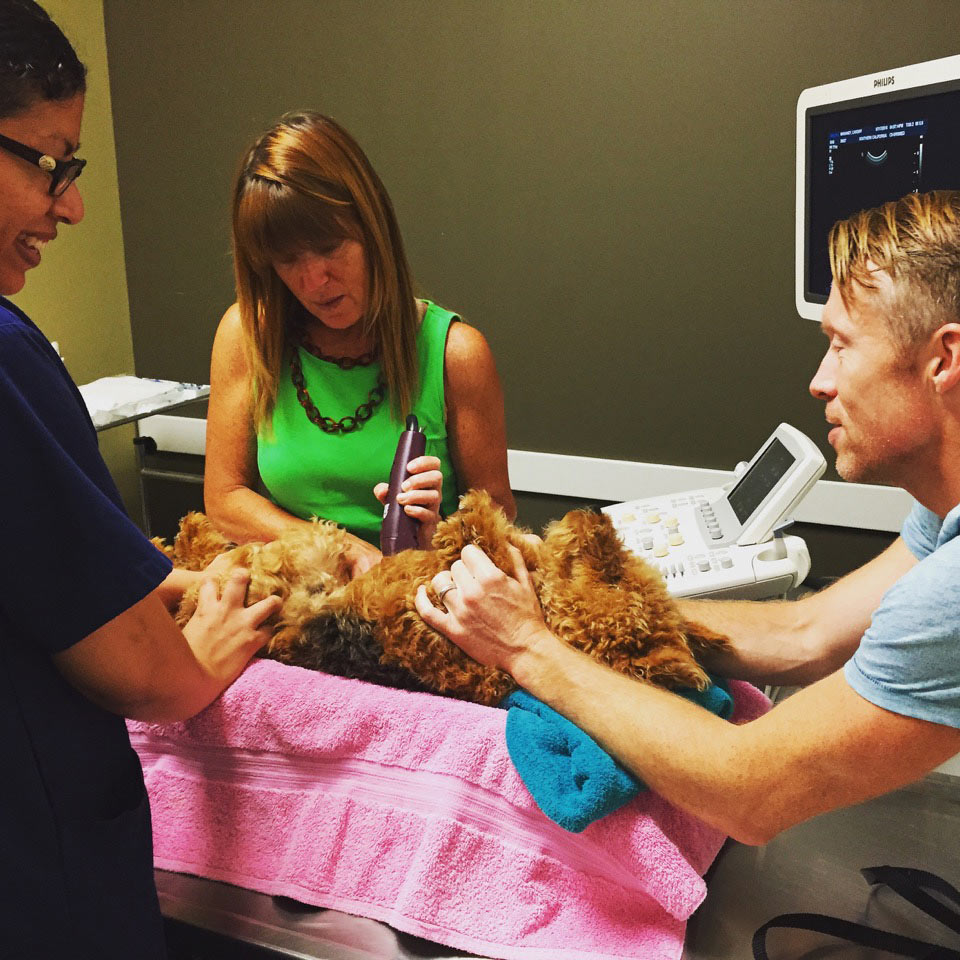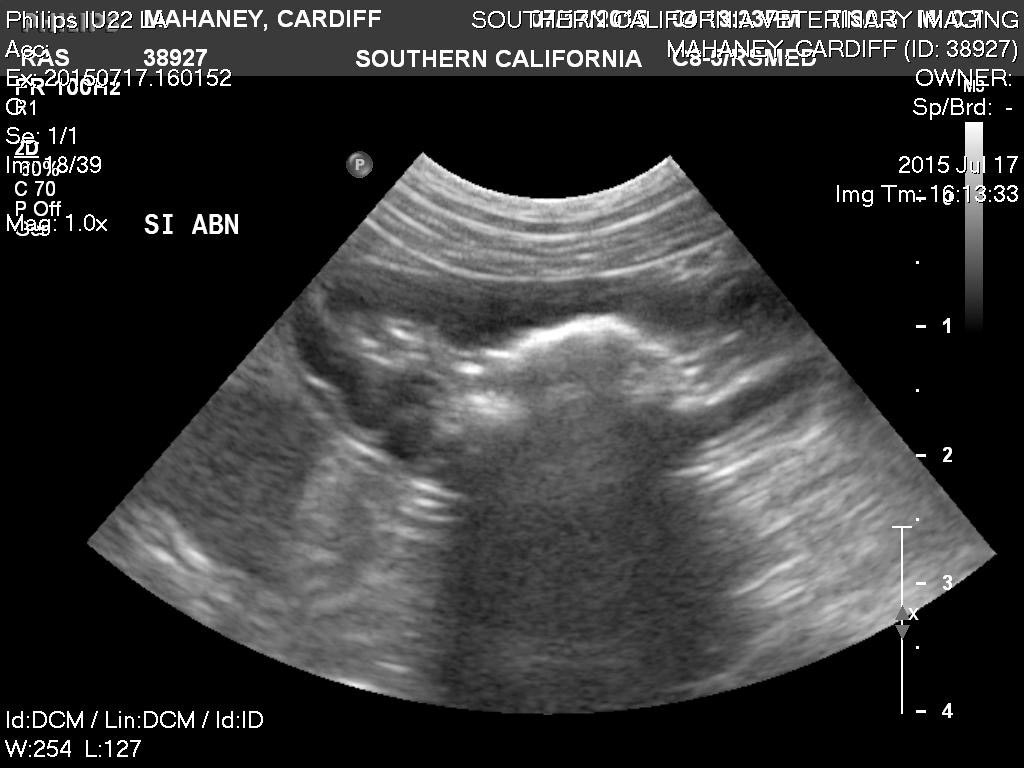Although I strongly suspected Cardiff was having a recurrence of cancer (When Cancer That Was Successfully Treated Reoccurs in a Dog), I still had to take the appropriate diagnostic steps to rule out other disease.
Although he has a history of T-Cell Lymphoma manifesting as a tumor on a loop of small intestine, the fact that Cardiff is showing similar clinical signs doesn't necessarily mean he has a recurrence of cancer. Unfortunately for both owners and the veterinarians overseeing their patients’ care, the clinical signs of cancer affecting the intestines are similar to a variety of other ailments of the digestive tract, including:
 The abdominal ultrasound showed another mass-like lesion on his small intestine which was creating a partial obstruction so that food and fluid couldn't move through as well. Additionally, there was an enlarged lymph node adjacent to the site of concern. Therefore, the most likely cause of Cardiff’s illness was a recurrence of Lymphoma.
The abdominal ultrasound showed another mass-like lesion on his small intestine which was creating a partial obstruction so that food and fluid couldn't move through as well. Additionally, there was an enlarged lymph node adjacent to the site of concern. Therefore, the most likely cause of Cardiff’s illness was a recurrence of Lymphoma.
 Fortunately, chest and abdominal radiographs (x-rays) showed no detectable disease that could be contributing to his clinical signs.
As there are many treatment options we could have taken, I'm going to explore the options and my chosen treatment in my next column. Stay tuned, as Cardiff’s story evolves with each passing day.
Fortunately, chest and abdominal radiographs (x-rays) showed no detectable disease that could be contributing to his clinical signs.
As there are many treatment options we could have taken, I'm going to explore the options and my chosen treatment in my next column. Stay tuned, as Cardiff’s story evolves with each passing day.
 Dr. Patrick Mahaney
Copyright of this article (2015) is owned by Dr Patrick Mahaney, Veterinarian and Certified Veterinary Acupuncturist. Republishing any portion of this article must first be authorized by Dr Patrick Mahaney. Requests for republishing must be approved by Dr Patrick Mahaney and received in written format.
Dr. Patrick Mahaney
Copyright of this article (2015) is owned by Dr Patrick Mahaney, Veterinarian and Certified Veterinary Acupuncturist. Republishing any portion of this article must first be authorized by Dr Patrick Mahaney. Requests for republishing must be approved by Dr Patrick Mahaney and received in written format.
- Appetite changes — Anorexia (no appetite) or hyporexia (decreased appetite)
- Vomit — Active abdominal contraction to expel stomach contents
- Regurgitation — Passive evacuation of stomach contents (appears similar to vomit)
- Diarrhea — Some combination of soft or liquid stools, changes in bowel movement patterns, mucus, blood, flatulence, etc.
- Lethargy — Having less energy for day-to-day activities
- Intestinal parasites — Giardia, coccidia, roundworm, hookworm, whipworm, etc.
- Pathogenic bacterial infection — Salmonella, E. coli, Listeria, etc.
- Overgrowth of normal digestive tract bacteria — Clostridia, etc.
- Dietary indiscretion — eating something a dog should not
- Other
- Gastrointestinal ulceration — Yet, Cardiff was not taking any medications or supplements known to cause stomach or intestinal ulceration
- Cancer — Recurrence of Lymphoma or other
- Foreign body ingestion/obstruction — Something Cardiff could have eaten could be causing serious irritation or be stuck his stomach or intestine
- Other
- Famotidine (Pepcid) — An antacid injection (when vomiting) or oral treatment
- Carafate (sucralfate) — A stomach coating agent given as a slurry (tablet dissolved in liquid)
- Subcutaneous fluids — fluids under the skin, which keeps all body tissues hydrated, replace lost electrolytes, and facilitate excretion of toxic substances
- Vitamin B 12 (cyanocobalamin) — a water-soluble vitamin that is crucial for normal immune system and gastrointestinal function and the absorption of nutrients
 The abdominal ultrasound showed another mass-like lesion on his small intestine which was creating a partial obstruction so that food and fluid couldn't move through as well. Additionally, there was an enlarged lymph node adjacent to the site of concern. Therefore, the most likely cause of Cardiff’s illness was a recurrence of Lymphoma.
The abdominal ultrasound showed another mass-like lesion on his small intestine which was creating a partial obstruction so that food and fluid couldn't move through as well. Additionally, there was an enlarged lymph node adjacent to the site of concern. Therefore, the most likely cause of Cardiff’s illness was a recurrence of Lymphoma.
 Fortunately, chest and abdominal radiographs (x-rays) showed no detectable disease that could be contributing to his clinical signs.
As there are many treatment options we could have taken, I'm going to explore the options and my chosen treatment in my next column. Stay tuned, as Cardiff’s story evolves with each passing day.
Fortunately, chest and abdominal radiographs (x-rays) showed no detectable disease that could be contributing to his clinical signs.
As there are many treatment options we could have taken, I'm going to explore the options and my chosen treatment in my next column. Stay tuned, as Cardiff’s story evolves with each passing day.
 Dr. Patrick Mahaney
Copyright of this article (2015) is owned by Dr Patrick Mahaney, Veterinarian and Certified Veterinary Acupuncturist. Republishing any portion of this article must first be authorized by Dr Patrick Mahaney. Requests for republishing must be approved by Dr Patrick Mahaney and received in written format.
Dr. Patrick Mahaney
Copyright of this article (2015) is owned by Dr Patrick Mahaney, Veterinarian and Certified Veterinary Acupuncturist. Republishing any portion of this article must first be authorized by Dr Patrick Mahaney. Requests for republishing must be approved by Dr Patrick Mahaney and received in written format.